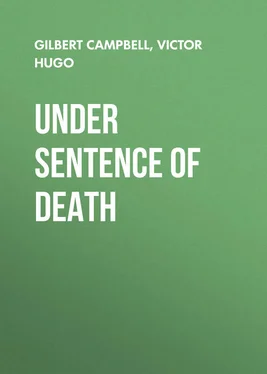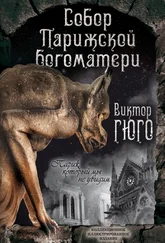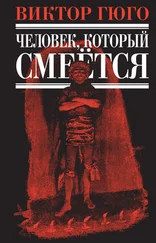Виктор Мари Гюго - Under Sentence of Death
Здесь есть возможность читать онлайн «Виктор Мари Гюго - Under Sentence of Death» — ознакомительный отрывок электронной книги совершенно бесплатно, а после прочтения отрывка купить полную версию. В некоторых случаях можно слушать аудио, скачать через торрент в формате fb2 и присутствует краткое содержание. Жанр: foreign_prose, literature_19, foreign_antique, на английском языке. Описание произведения, (предисловие) а так же отзывы посетителей доступны на портале библиотеки ЛибКат.
- Название:Under Sentence of Death
- Автор:
- Жанр:
- Год:неизвестен
- ISBN:нет данных
- Рейтинг книги:5 / 5. Голосов: 1
-
Избранное:Добавить в избранное
- Отзывы:
-
Ваша оценка:
- 100
- 1
- 2
- 3
- 4
- 5
Under Sentence of Death: краткое содержание, описание и аннотация
Предлагаем к чтению аннотацию, описание, краткое содержание или предисловие (зависит от того, что написал сам автор книги «Under Sentence of Death»). Если вы не нашли необходимую информацию о книге — напишите в комментариях, мы постараемся отыскать её.
Under Sentence of Death — читать онлайн ознакомительный отрывок
Ниже представлен текст книги, разбитый по страницам. Система сохранения места последней прочитанной страницы, позволяет с удобством читать онлайн бесплатно книгу «Under Sentence of Death», без необходимости каждый раз заново искать на чём Вы остановились. Поставьте закладку, и сможете в любой момент перейти на страницу, на которой закончили чтение.
Интервал:
Закладка:
Every blow of the hammer as it fell on the anvil made the chin of the patient quiver; the slightest movement either forwards or backwards would have crushed the skull like a nutshell.
When this operation had been concluded, an appearance of gloom came over them; nothing could now be heard except the clanking of the chain, and at intervals a cry, and the sound of a blow, as the canes of the guards fell heavily upon the refractory convicts. Some of them wept, some trembled and bit their lips. I gazed with terror upon all these sinister faces in their iron frames.
So there were three acts in this lugubrious drama—the visit of the doctors, the visit of the gaolers, and the fixing of the chain. Suddenly a ray of sunlight appeared. From the conduct of the convicts it would have seemed that this gleam of light had set every brain on fire. They sprang to their feet with an unanimous effort. The five chains of criminals joined hands, and whirled in a mad dance round the lamp-post in the centre of the court, until the brain grew dizzy with watching their evolutions. They shouted out a song of the galleys, a slang romance set sometimes to a plaintive air, and at others to a gay and rollicking tune. Loud cries were heard, the panting of overtasked chests, and every now and then mysterious words were interchanged. The clanking of the chains served as the orchestra for the song, in itself more discordant than its accompaniment. Should I have desired to see a representation of the revels of demons, I could not have selected a better or a worse example.
Large buckets were then brought into the courtyard. The guards broke up the convicts’ dance with blows and curses, and forced them to the buckets, in which I could see a few herbs swimming in some dirty smoking liquid.
Then they sat down and ate.
After having finished their meat they threw what remained upon the pavement, and recommenced their songs and dances. It is the custom to relax discipline a little during the day and the night upon which the chain is fastened on.
I was gazing upon this strange spectacle with so greedy a curiosity, and was watching its every phase with such attention, that I absolutely forgot myself. A deep feeling of pity crept over me, and their hollow laughter made me feel inclined to weep.
All of a sudden, in the midst of the sad reverie into which I had fallen, I saw the ring of dancers stop short, become perfectly silent, and then I noticed that every eye was fixed upon the window at which I was standing.
“The condemned man! the condemned man!” exclaimed they. Every finger was pointed at me, and the shouts of diabolical laughter were redoubled.
I was paralyzed. I could not understand how they could know me, how they could have recognized me.
“Good-day! good-day!” they cried, in piercing accents.
One of the youngest of the band, condemned to the galleys for life, gazed upon me with an envious look, and shouted, “Ah, you are in luck, for you will be sliced! Farewell, comrade.”
I hardly know how I felt. It was a fact, I was their comrade, for the Place de Grêve is the sister of the Galleys of Toulon; I even occupied a higher position than they did, and they paid me homage. I shuddered at the idea.
Their comrade—yes, and a few days later I should in my turn furnish a spectacle for men of their stamp.
I had remained spell-bound at the window, motionless, and unable to collect myself; but when I saw the five chains rushing towards me with expressions of fiendish cordiality, when I heard the clash of their chains and the tramp of their footsteps close to the wall, it seemed to me as if a crowd of demons were about to storm my wretched cell. I uttered a loud cry, and cast myself with violence against the door; but there was no means of escape, for it was securely bolted without. I pressed against it, I cried out in mingled terror and rage. I seemed to hear the hated voices of the convicts drawing nearer and nearer; I fancied that I could perceive their hideous heads appear above the window-sill. I uttered another cry of terror, and I fainted.
CHAPTER XIV
When I came to myself it was night; I was lying on a truckle-bed. By the light of a lamp which hung from the ceiling I could see other beds placed in lines. Then I understood that I had been brought to the hospital.
For a few seconds I remained still; I was awake, but without consciousness or recollection. At any other time this hospital bed in the midst of a prison would have made me recoil with disgust, but I was no longer the same man. The sheets were coarse to the touch, and of a grey hue; the counterpane was thin and ragged; you could feel the palliasse through the mattress. But what did that matter? My limbs could stretch themselves freely between the coarse sheets, and the bed-clothes, thin as they were, drove away that terrible cold which seemed to freeze my very marrow. After a short interval I went to sleep again.
A great disturbance awoke me. It was broad daylight. The noise came from the outside. My bed was next to a window; I raised myself up to see what was the cause of the noise.
The window looked upon the main courtyard of the Bicêtre. It was crowded; a body of pensioners had great difficulty in keeping open a narrow path through the centre of the populace. Between a double rank of soldiers five long waggons, filled with men, jolted heavily along. The convicts were starting for their destination.
The vehicles had no covering. Each chain occupied one; the convicts were seated on a bench running down the centre, back to back, with the chains between them, and at the end stood a soldier with a loaded musket. You could hear their chains clank with every jolt, and their legs shake as they dangled over the side of the cart.
A fine searching rain was falling, chilling the air, and making their thin clothes cling to their limbs; their long beards and short hair were saturated with moisture, their faces were violet with the cold; I could see them shiver, and hear their teeth chatter with cold, and impotent rage.
Once riveted to the chain, a man ceased to exist as a separate individual. He must relinquish his intelligence, for the collar of the galleys condemns him to a living death, and, like a mere animal, he can only partially satisfy his appetite at given hours. Motionless, the majority of them half-naked, with bare heads and dangling feet, they commenced their journey of twenty-five days’ duration. Crowded together in the carts, garments of the same texture serving them as a defence against the scorching sun of July and the cold rains of November, it almost seemed as if man were endeavouring to press the elements into the post of executioner. The five waggons, escorted by cavalry and infantry, passed in turn through the main gateway of the Bicêtre; a sixth followed, in which were heaped together small boilers, copper vessels, and spare chains. A few of the guards who had lingered in the canteens hurried to gain their posts; the crowd melted away, and all the ghastly sight vanished like a dream of the night.
The sound of the wheels and the tramp of the horses grew fainter and fainter on the paved road that leads to Fontainebleau; the cracking of whips, the clink of chains, and the shouts of the populace as they wished the galley-slaves a prosperous journey, all died away. And for them this was only the beginning.
What was it my counsel said to me?
The galleys!
Ah, yes, death a thousand times sooner than that. Annihilation rather than hell. Sooner give my head to the knife of Guillotine, than my neck to the galley-slave’s collar. The galleys, just Heaven, never!
CHAPTER XV
Unfortunately I was not ill; the next day I had to leave the hospital, and once more I was relegated to my cell. Not ill! In point of fact, I am young, vigorous, and healthy. The blood flows freely in my veins, my limbs are under perfect control, I am strong in body and in intellect, made for a long life, and yet I am suffering from a mental disease, a disease the work of men’s hands.
Читать дальшеИнтервал:
Закладка:
Похожие книги на «Under Sentence of Death»
Представляем Вашему вниманию похожие книги на «Under Sentence of Death» списком для выбора. Мы отобрали схожую по названию и смыслу литературу в надежде предоставить читателям больше вариантов отыскать новые, интересные, ещё непрочитанные произведения.
Обсуждение, отзывы о книге «Under Sentence of Death» и просто собственные мнения читателей. Оставьте ваши комментарии, напишите, что Вы думаете о произведении, его смысле или главных героях. Укажите что конкретно понравилось, а что нет, и почему Вы так считаете.












